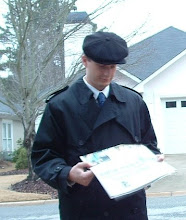Telephones have evolved from fixed, expensive devices on wired networks to cheap, mobile devices on wireless networks. Our placement of calls has likewise evolved from reaching out to places to reaching out to inviduals. I used to call my grandmother at her house, so my intentionality was calling her house in hopes of reaching her individually or whoever else may answer. Calling my mom used to be like that, but since she relies on a mobile phone these days, the idea is like calling my mom's purse rather than her house. So when I call her I know the call is directed at her personally rather than her residence. That means she might answer while she is in a grocery store, and it means I'll have fewer conversations with my stepfather.
Sometimes, though, you don't want to reach someone if she is not at home. If she is not at home, she may be busy, and you only want to talk to her if she has free time and not bother her otherwise. Other times, though, you want to reach someone regardless of where they are, and it is disappointing if your only option is to catch them at home. So it is interesting to have two options to fit different moods and different reasons for calling.
I can't guess what the specifics might be, but it seems like mobile phones have an implication for our society in the way we reach out to people and where we talk to them. We're often reaching people's persons rather than fixed places now.
April 26, 2009
April 16, 2009
The 'at' sign on Twitter is stupid anywhere else
If you aren't on Twitter, there is no reason to use the "@" character when responding to people on comments on webpages. See, before there was Twitter, and before there was the Internet, if you were addressing a written passage to someone named Fred, you would type:
You just type the person's name and then a comma. If you go back in time before Twitter, no one would type:
See, the "@" symbol has a function in Twitter's programming, to direct the message to the account called "Fred." Anywhere else it looks stupid.
Fred, I am responding to ...
You just type the person's name and then a comma. If you go back in time before Twitter, no one would type:
@Fred: ...
See, the "@" symbol has a function in Twitter's programming, to direct the message to the account called "Fred." Anywhere else it looks stupid.
April 12, 2009
Senior citizen entitlement
We've heard too much about how younger people supposedly have a sense of entitlement and expect rewards without hard work. Supposedly the older generation knows the value of hard work and gratitude. However, there are members of the older generation who demand their senior citizen discounts at fast food restaurants and act offended when a cashier charges their coffee at regular price. Who has the sense of entitlement now, buddy?
I'm not sure why we even have senior citizen discounts. Is their loyalty to a restaurant worth more than mine? Is it because old people need a break? The senior citizens eating breakfast at my regular fast-food joint would likely rant against socialism and progressive taxes and government-funded healthcare, but they'll do it while drinking their discounted coffee. Sure, some older people are on modest, fixed incomes, but others have amassed a lifetime of wealth and could buy the whole restaurant.
I'm not sure why we even have senior citizen discounts. Is their loyalty to a restaurant worth more than mine? Is it because old people need a break? The senior citizens eating breakfast at my regular fast-food joint would likely rant against socialism and progressive taxes and government-funded healthcare, but they'll do it while drinking their discounted coffee. Sure, some older people are on modest, fixed incomes, but others have amassed a lifetime of wealth and could buy the whole restaurant.
Subscribe to:
Comments (Atom)

